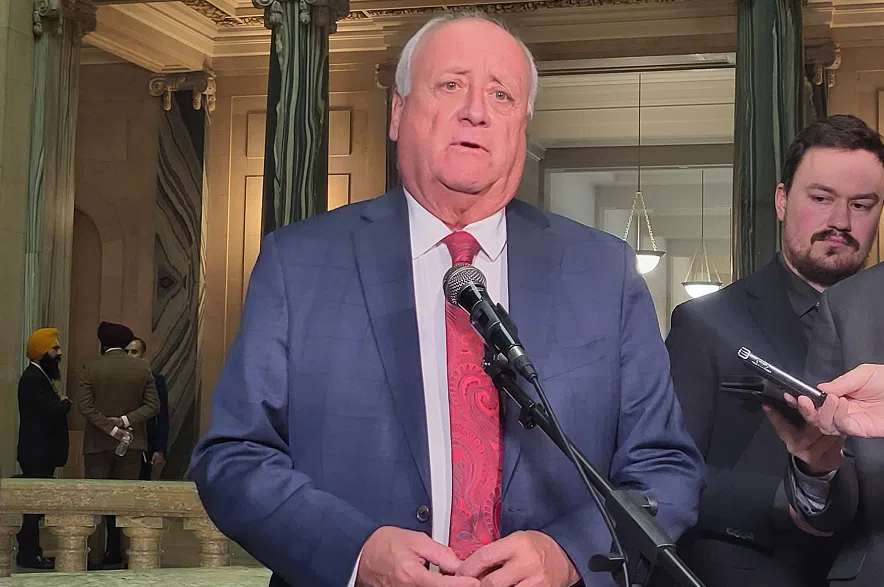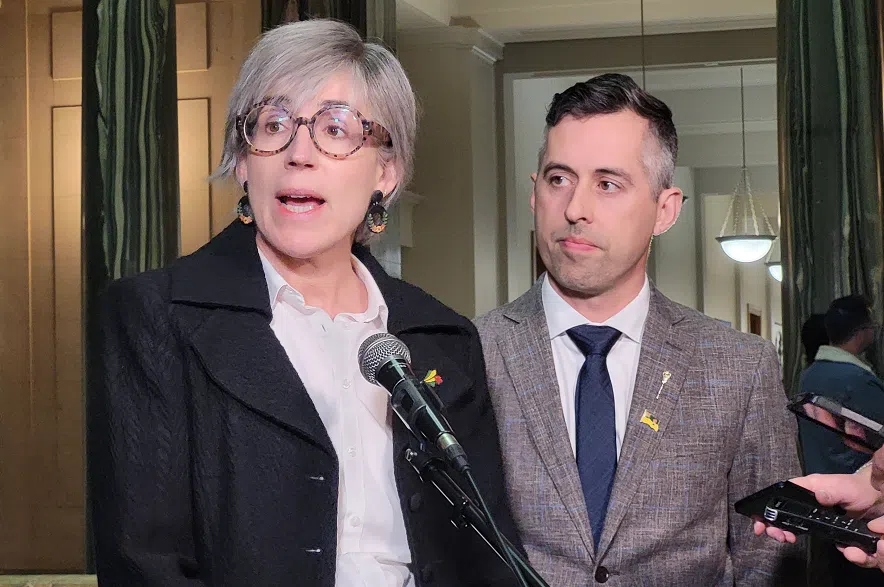The Saskatchewan NDP is accusing the provincial government of using an American company for park reservations and hunting and fishing licenses.
Last month, the government said it would prioritize Canadian suppliers with the goal of reducing or eliminating U.S. procurement, in a move responding to tariffs on Canadian goods imposed by U.S. President Donald Trump.
Read More:
- Tariffs threat not built into Sask. 2025-26 budget
- How are tariffs impacting the Saskatchewan brewing industry?
- Bachynski joins mayors from Canada, U.S., Mexico to call for end to tariffs
The NDP said Scott Moe’s Saskatchewan Party government pays RA Outdoors LTD, a Texas-based company operating as Aspira, roughly $2 million per year. The opposition noted that the province has been working with Aspira since 2012.
Jared Clarke, NDP MLA for Regina Walsh Acres, said his party called the provincial fishing license help line, and ended up on the phone with someone in New York.
“Why is this contract continuing to be outsourced out of Canada into the U.S.?” Clarke asked.
“It’s clear the Sask Party is more interested in taking Donald Trump’s lead, hook, line and sinker, but we want to see that contract canceled and brought to Saskatchewan.”
Erika Ritchie, NDP MLA for Saskatoon Nutana, said with Trump expected to impose additional tariffs on Canada on Wednesday, her party wants the government to ensure that procurement contracts go to Saskatchewan and Canadian companies.
“We’ve known for months, even before Donald Trump was elected, he’s been threatening these tariffs on Canada,” Ritchie said.
“The government had more than enough time to review these kinds of procurement contracts and look to our great, innovative companies here in Saskatchewan to offer this kind of procurement service instead, and they failed to do so.”
Darcy Warrington, the NDP MLA representing Saskatoon Stonebridge, noted that Manitoba and Alberta are using the same system used in Saskatchewan.
“My understanding is Manitoba is actually leaning away from it as well. British Columbia, Ontario, parts of the Maritimes, they don’t use a system from the United States. Or if they do, there are at least examples of it in Canada where this isn’t the case,” he said.
“We need to start looking at all of the procurement in the province, whether it’s for physical materials or whether it’s for services, and this is just the beginning of where we need to start those investigations.”

David Marit, the minister responsible for Sask Builds and procurement, said the majority of contracts awarded by the provincial government go to Saskatchewan or Canadian companies. (Daniel Reech/980 CJME)
David Marit, the minister responsible for Sask Builds and procurement, said that more than 95 per cent of the “historic contract awards” over the last five to six years went to Saskatchewan or Canadian companies.
He said it is not fair for NDP to call on the government to scrap contracts with links to the U.S.
“There’d be challenges around that,” Marit said.
“There could be penalties. There could be fees, in some cases. In some of the contracts awarded, there isn’t a Saskatchewan company that provides that service one way or another, maybe not even a Canadian one.”
Marit added that some companies have long-term contracts with companies outside of Canada’s borders, and the government has to “respect that.”
“That’s what the procurement is about. We put out the RFP, the companies bid on it and supply the product, and it’s their responsibility on how they source that product,” he said.
“We’re just asking companies that the RFPs and those that are bidding on them to look at sourcing. It doesn’t mean they will.”
Marit said what the government is really concerned about on the procurement side of things is making sure contracts are “open and transparent” while also getting the best deal for Saskatchewan taxpayers.
“That’s the normal process of what an RFP is,” the minister said.
“That’s a very public and open, transparent process. The companies can bid on it, whether they’re from Canada, Saskatchewan or United States. I’m hopeful that Canadian companies or Saskatchewan companies can be competitive in the bidding process.”
–with files from 980 CJME’s Daniel Reech











